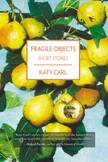Review: Is it really possible to transform your life?
I would be willing to bet that at least 50 percent of magazine covers and click-bait headlines shout some version of the promise (or imperative) to “transform your life.” These promises appeal to a very human instinct that originates in insecurity and the earnest desire to shed what should be left behind and embrace what we think should be embraced. Ironically, the relentless push for us to change our lives obscures the truth that we are always changing, as are the circumstances around us. We move, we take new jobs, we age. Seasons turn gleaming summer sun into auburn autumn light.
In her debut collection of short stories, Fragile Objects, Katy Carl examines how people manage change in their lives—whether they have actively sought what comes next or had it forced upon them.
For the epigraph of Fragile Objects, Carl chose a quotation from Virginia Woolf’s short story “Solid Objects”:
You know how the body seems to shake itself free from an argument, and to apologize for a mood of exaltation; flinging itself down and expressing in the looseness of its attitude a readiness to take up with something new—whatever it may be that comes next to hand.
The title of Carl’s collection would suggest that the characters in her stories often are not ready to “take up with something new.” They resist, in body or in spirit, or rush to transform themselves and are stunned by the challenges they confront.
As she did in As Earth Without Water, Carl tackles issues such as sexual abuse within the Catholic Church and the repercussions of individuals’ choices.
Carl has shown her skill in other writing genres in previous works: She is the author of the novel As Earth Without Water and Praying the Great O Antiphons: My Soul Magnifies the Lord. She also serves as the editor in chief of Dappled Things magazine. But it is in these stories that she demonstrates her ability to enter into the lives of diverse people, places and circumstances. And whether in a near-novella or in flash fiction spanning less than a page, the collection displays her range as a writer and her formidable flair for storytelling.
The collection opens with its titular story, “Fragile Objects,” with the elderly grandmother of a character named Bub exclaiming about the ways her son, Bub’s father, is hurting her. Along with trying to keep her house maintained, her son is slyly taking her car keys because he thinks it is not safe for her to drive anymore. She yells at him, “Hurt me makin’ plans about me I ain’t never agreed to…. I ain’t never agreed to any of it.” She resists the changes of old age, but she also resists what it would mean to accept help. This ultimately has devastating consequences.
“Fragile Objects” deals with personal changes within a family, while some stories in Carl’s collection address changes that have effects on communities or institutions. As she did in As Earth Without Water, Carl tackles issues such as sexual abuse within the Catholic Church and the repercussions of individuals’ choices. “Company Men” begins with a conversation between a bishop and his assistant as they realize that they can no longer ignore what they have suspected to be true. The assistant, Hernandez, tries to direct the situation so it will unfold how he would will it.
About one of the priests involved in the issue, Carl writes, “Over the last half-dozen years, [he had] transmuted into a man who did not upset boats. If only, Hernandez wished, the barque of Peter could always be so smoothly sailed.” Changing tides, not smooth sailing, though, are bound for those at the center of this diocesan disaster. Carl deftly shows the consequences of wanting nothing to change and absenting oneself from situations that necessitate action.
The story’s narrator states, “The bishop had known he would have to deal with this for awhile now, but he had not been ready to act.” Even his way of acting is passive. When the bishop finally speaks with the assistant pastor, he says, “‘My son […] I heard you were looking for a change.’ Mortimer almost blushed. ‘Not on my own initiative, Father. Donner sent me.’” The characters in “Company Men” wish to stay as they are. They desire smooth sailing and quiet corners where they can go on living, unchanged and undisturbed. Of course, these wishes are not granted.
In “Omnes Habitantes in Hoc Habitaculo,” originally published in The Windhover, the main character, Mignon, undergoes an intense change—one that she avoids and does not even realize she needs. Toward the end of the story, another character tells Mignon, “Whatever you are expecting when you go back into the real world, it will be different.” The characters in Carl’s collection discover that this is true and find themselves somewhat unprepared to face those differences, whether they have had transformation thrust upon them or sought it themselves. And in the day-to-day existence of that changed life, they desperately seek some new terra firma.
In Carl’s stories, readers will be reminded that true change—especially when it comes to transforming a life—is a fragile thing.
In “The Convert,” for example, Tyler, a college student, enthusiastically converts to Catholicism. He is eager to put on a new self, to die to his old self. To leave his old ways behind, Tyler had “jumbled annoyance with his housemates, desire for friends who also understood faith (he figured they must exist somewhere), and suspicion that his current friends prevented him from making the good decisions he meant to start making, but never managed to make.”
Yet even cutting ties with old friends does not feel sufficient for Tyler, and he spends most of the story feeling frustrated and seeking new ways to change himself and to deepen his conversion. Toward the end of the story, Tyler is in desperate need of money and searches his own pockets, coming up empty. Then, “breathing fast, he explored the pockets of the coat the monk had given him. The right-hand pocket held a dollar bill, plus a little change.”
Here, Carl gives readers one of many moments where a character’s interior life and exterior circumstances are brought together. As Tyler roots in the coat for coins, the reader naturally wonders how he will use it. The question, then—not just for Tyler, but for readers, too—is how will we spend our change?
Some characters think they are more ready to answer that question than they actually are. In “Sequatchie Valley,” the collection’s longest story (which comes close to being a novella), a family is deciding to move from an apartment in Birmingham to a multi-acre farm despite lacking any previous farming experience. Justifying his decision to his wife, Lucia, Ward asserts, “It’s time to stop dreaming about the life we wish we had and start living it, you know?” To prove to his wife and to himself that this is the right choice, Ward lists what he has learned from his Google searches about gaining organic certification for the farm, and the other steps in his plan to make their new life profitable and sustainable. “But until we can do that,” he says, “what have people ever done? We’ll manage.”
Yes, like Carl’s vivid characters, we do manage, often fitfully, sometimes smoothly and productively, and rarely ever as we envisioned it. In Carl’s stories, readers will be reminded that true change—especially when it comes to transforming a life—is a fragile thing.











